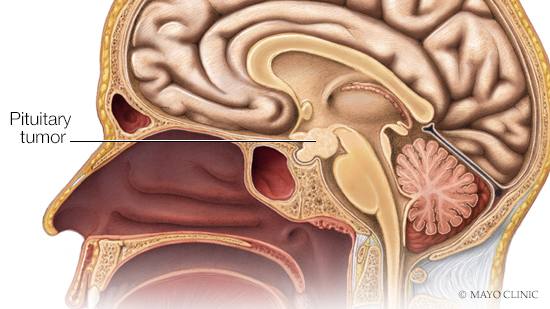-
Neurosciences
Mayo Clinic Q&A podcast: Understanding pituitary tumors

Pituitary tumors are abnormal growths that develop in your pituitary gland. Pituitary tumors can cause too much or too little of the hormones that regulate important functions of your body to be produced. Most pituitary tumors are noncancerous growths called adenomas, which remain in your pituitary gland or surrounding tissues and don't spread to other parts of your body.
"It's very uncommon for any pituitary tumor to be a malignancy or what one would commonly think about as a cancer or something that would travel elsewhere," says Dr. Jamie Van Gompel, a Mayo Clinic neurosurgeon. "Almost all of these are benign tumors."
Pituitary tumors are categorized as functioning or nonfunctioning, depending on if they are producing hormones.
The signs and symptoms of nonfunctioning pituitary tumors, those that don't make hormones, nonfunctioning are related to their growth and the pressure they put on other structures.
"Out of all pituitary tumors, about half of them aren't making any kind of a substance," explains Dr. Van Gompel. "And those are called nonfunctioning adenomas or tumors. And they cause problems by putting pressure on things nearby. So they'll either take up enough room where the pituitary gland is so that it doesn't function well, and you have to get medications to replace some of that function. Or you may start to lose vision. That's another very common presenting symptom with these. "
Pituitary tumors that make hormones, called functioning, can cause a variety of signs and symptoms depending on the hormone they produce.
"Functioning tumors cause distinct syndromes," says Dr. Van Gompel. "The three most common are prolactin-secreting tumors, Cushing's and acromegaly."
Dr. Van Gompel explains overproduction of prolactin from a pituitary tumor can cause breast milk to develop in women, even when they aren't postpartum. In men, it often affects sexual function.
In Cushing syndrome, the body creates too much cortisol. The hallmark signs of Cushing syndrome are a fatty hump between the shoulders, a rounded face, and pink or purple stretch marks on your skin. Cushing syndrome also can result in high blood pressure, bone loss and, sometimes, Type 2 diabetes.
Acromegaly is a hormonal disorder that develops when the pituitary gland produces too much growth hormone during adulthood, causing bones to increase in size. In childhood, this leads to increased height and is called gigantism. But in adulthood, a change in height doesn't occur. Instead, the increase in bone size is limited to the bones of the hands, feet and face.
There are various options for treating pituitary tumors, including removing the tumor, controlling its growth and managing your hormone levels with medications.
Surgery often is needed if a pituitary tumor is pressing on the optic nerves or if the tumor is overproducing certain hormones. Most often, surgery is done endoscopically through the nasal cavity. The neurosurgeon removes the tumor through the nose and sinuses without an external incision. No other part of the brain is affected, and there's no visible scar.
Mayo Clinic is one of the largest pituitary centers in the U.S., evaluating and treating more than 1,600 people with pituitary tumors every year. Dr. Van Gompel explains that being treated at a referral center that sees a high volume of pituitary tumors is important.
"Here at Mayo, we have huge expertise, and a group of people that know how to manage these adenomas," explains Dr. Van Gompel. "We're fortunate to have excellent colleagues in neuroradiology because the imaging matters to help locate the tumors. We also have a team of endocrinologists who focus specifically on treatment and management of pituitary tumors. And we have surgeons, like me, who focus on adenomas. We're constantly working together studying our outcomes to make sure they're as good, if not better, than they were last year, to improve care for our patients."
On the Mayo Clinic Q&A podcast, Dr. Van Gompel discusses options for treating pituitary tumors.
Watch: Dr. Van Gompel discuss pituitary tumors.
For the safety of its patients, staff and visitors, Mayo Clinic has strict masking policies in place. Anyone shown without a mask was either recorded prior to COVID-19 or recorded in a nonpatient care area where social distancing and other safety protocols were followed.







